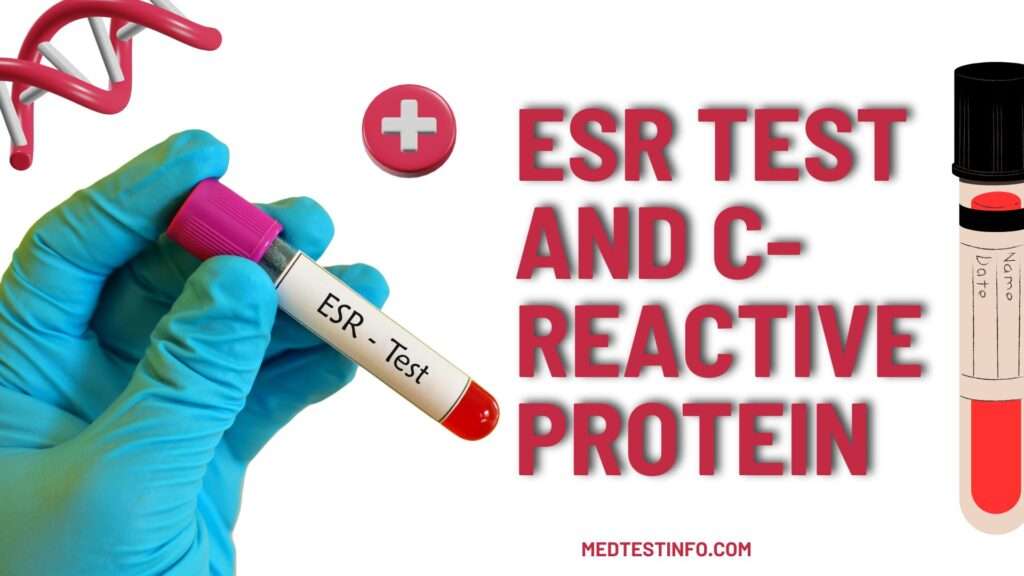
Overview
Inflammation represents a physiological response of the body to injury or infection. However, when it persists over time, it can lead to various health issues, including autoimmune disorders, heart problems, and even cancer. Healthcare providers frequently use two crucial blood tests to detect and monitor inflammation: erythrocyte sedimentation rate (ESR) and C-reactive protein (CRP). Both tests help us understand inflammatory processes, but they focus on different aspects and have unique purposes in diagnosis. In this article, we’ll look at the science behind these tests, their functions in medical diagnosis, and how they differ in clinical settings. Understanding ESR and CRP can help you gain vital insights into your health.
What Is The Erythrocyte Sedimentation Rate (ESR)?
The Erythrocyte Sedimentation Rate (ESR) test determines how red blood cells (erythrocytes) sink at the bottom of a test tube over a specific period, usually one hour. In healthy people, red blood cells settle slowly. However, substances like fibrinogen cause red blood cells to cluster and settle more quickly in inflammation.
ESR is a widely used inflammatory marker that helps doctors assess the presence of inflammation in the body. Elevated levels can indicate conditions like autoimmune diseases or chronic infections.
How Is The ESR Test Performed?
The ESR test is a straightforward technique that involves drawing a blood sample and placing it in a tall, thin tube. The red blood cell loss rate is millimeters per hour (mm/hr). Elevated ESR levels suggest the presence of inflammation, but they do not reveal the actual reason. As a result, ESR is frequently combined with other tests, such as CRP or other clinical examinations, to provide a more complete diagnosis.
What Is CRP (C-reactive protein)?
The liver produces the C-reactive protein, often called CRP, as a response to acute inflammation. CRP levels directly show how much inflammation there is in the body, while ESR levels measure how fast red blood cells settle down. The liver releases CRP into the bloodstream when the body detects harmful signals like an infection or an injury. Elevated CRP levels can signal different inflammatory conditions, such as infections, autoimmune diseases, and heart-related issues.
High Sensitivity CRP (hs-CRP) For Cardiovascular Risk
The high-sensitivity CRP (hs-CRP) test measures small amounts of CRP to help assess the risk of heart disease. Higher levels of hs-CRP have been linked to a greater risk of heart attacks and strokes, highlighting its importance as a marker in preventive cardiology. Unlike regular CRP, which focuses on acute inflammation, hs-CRP can identify ongoing, low-level inflammation that could play a role in heart disease.
ESR Vs CRP: Understanding The Differences
ESR and CRP are commonly used to identify inflammation but serve distinct purposes. The ESR is a longer-term indicator showing inflammation over time, while CRP provides a quick view of current inflammatory activity. The ESR test is often utilized to assess ongoing health issues like rheumatoid arthritis and lupus, where inflammation may fluctuate over time. In contrast, CRP is used to detect acute infections and short-term inflammatory reactions.
When Should I Use ESR And CRP?
ESR is more susceptible to autoimmune diseases, persistent infections, and malignancies. A consistently elevated ESR might suggest conditions like polymyalgia rheumatica or temporal arteritis.
CRP provides a quick insight into inflammation levels, which makes it particularly useful for identifying acute issues like bacterial infections or flare-ups of autoimmune diseases. Higher CRP levels suggest ongoing health issues like heart disease or lupus.
The Role Of ESR And CRP In Diagnosing Diseases
ESR and CRP are critical in detecting and treating inflammatory and autoimmune disorders. However, they are seldom utilized as stand-alone tests. Doctors frequently analyze these findings with clinical symptoms and other diagnostic testing to determine the underlying cause of inflammation.
Autoimmune Disorders And Inflammatory Markers
In autoimmune disorders like lupus and rheumatoid arthritis, the immune system incorrectly assaults healthy tissues, resulting in persistent inflammation. In these situations, both ESR and CRP are frequently increased. However, every marker behaves differently. For example, in lupus patients, ESR rises during disease flares, although CRP levels may remain normal unless there is an infection or other problem.
Raised ESR and CRP levels together can suggest a serious inflammatory condition. If only the ESR is raised, the cause may be persistent inflammation rather than an acute infection. If only CRP is raised, this may indicate an infection or a cardiovascular incident.
What Are The Normal ESR And CRP Ranges?
Discuss the normal ESR and CRP levels based on age, gender, and other variables. You could add:
Normal ESR Range
For men: 0-15 mm per hour
For women: 0-20 mm/hour.
Children: 0-10 millimeters per hour
Elderly: Higher ranges are generally permissible owing to age.
Normal CRP Levels
Low CRP readings of less than one mg/L point to mild inflammation.
Hs-CRP: Levels under one mg/L indicate low cardiovascular risk, and levels greater than three mg/L indicate high risk.
Symptoms Of Elevated ESR And CRP
High sed rate and C-reactive protein (CRP) levels often indicate a significant inflammatory process in the body, suggesting conditions like autoimmune diseases, infections, or even cardiovascular disease. List symptoms that may cause someone to be tested for high ESR and CRP, such as:
Common Symptoms Of High ESR And CRP
Unexplained weariness or weakness
Chronic fever or inflammation
Joint discomfort, stiffness, or swelling (common in autoimmune disorders)
Weight loss or muscle aches.
Infection signs include fever, chills, and edema.
Factors That Influence ESR And CRP Levels
ESR and CRP levels can be influenced by various factors, including age, gender, and underlying medical problems. Pregnancy, for example, can increase ESR levels, but certain drugs, such as statins, can lower CRP levels.
Causes Of Elevated ESR
Several factors can contribute to high ESR levels, including:
- Lupus and rheumatoid arthritis are autoimmune illnesses.
- Chronic infections include TB and fungal infections.
- Cancer, particularly blood malignancies such as lymphoma and multiple myeloma.
Elevated CRP Causes
CRP levels typically increase in response to:
- Acute infections include bacterial infections and sepsis.
- Cardiac disease and acute coronary syndrome.
- Conditions like Crohn’s disease and ulcerative colitis cause inflammation in the bowel.
Uses Of ESR And CRP For Diagnosis
In many circumstances, clinicians combine ESR and CRP testing to understand a patient’s inflammatory condition better. While CRP is beneficial for diagnosing acute inflammation, ESR can provide information about chronic diseases. For example, a patient with high ESR and CRP levels may have a more serious inflammatory illness that necessitates immediate treatment.
ESR and CRP in Lupus: A high ESR combined with normal CRP can indicate disease activity without infection. However, elevated CRP levels in lupus may indicate an infection or another aggravating condition.
ESR and CRP in Heart Disease: Elevated hs-CRP levels are a well-known predictor of cardiovascular disease risk. ESR, however, is less widely utilized in this setting, but it can still indicate chronic inflammation contributing to heart disease.
Treatment For High ESR And CRP Levels
Treating elevated CRP and ESR levels requires addressing the underlying cause of inflammation. Antibiotics may be used to treat infections and reduce inflammation. Anti-inflammatory or immunosuppressive drugs are commonly used to treat autoimmune diseases.
For chronic inflammation: Lifestyle adjustments such as diet and exercise can help reduce ESR and CRP levels in people with chronic inflammation. Reducing CRP levels can be especially advantageous to cardiovascular health.
Polymyalgia rheumatica Treatment: Corticosteroids may be used to reduce ESR and improve symptoms in illnesses such as polymyalgia rheumatica, which causes considerable pain and stiffness.
Emerging Research In ESR And CRP
Recent research has looked into the function of CRP and ESR in predicting illness outcomes and identifying the mechanisms that underpin chronic inflammation. For example, high-sensitivity CRP (hs-CRP) is now a critical tool in predicting heart attacks and strokes in otherwise healthy people.
According to research on the genetic variables that influence ESR and CRP levels, certain people may be predisposed to greater inflammation markers, which may increase their risk of autoimmune disorders or cardiovascular issues.
Conclusion
Erythrocyte Sedimentation Rate (ESR) and C-reactive protein (CRP) are critical for recognizing and treating inflammatory disorders. While each test provides unique insights into the body’s inflammatory response, combining them allows for a complete knowledge of underlying health issues. Understanding these signs, whether tracking a chronic disease or analyzing acute inflammation, can guide successful therapy and enhance long-term health results.



Pingback: At-Home CRP Tests: Are They Reliable? - Medtestinfo.com